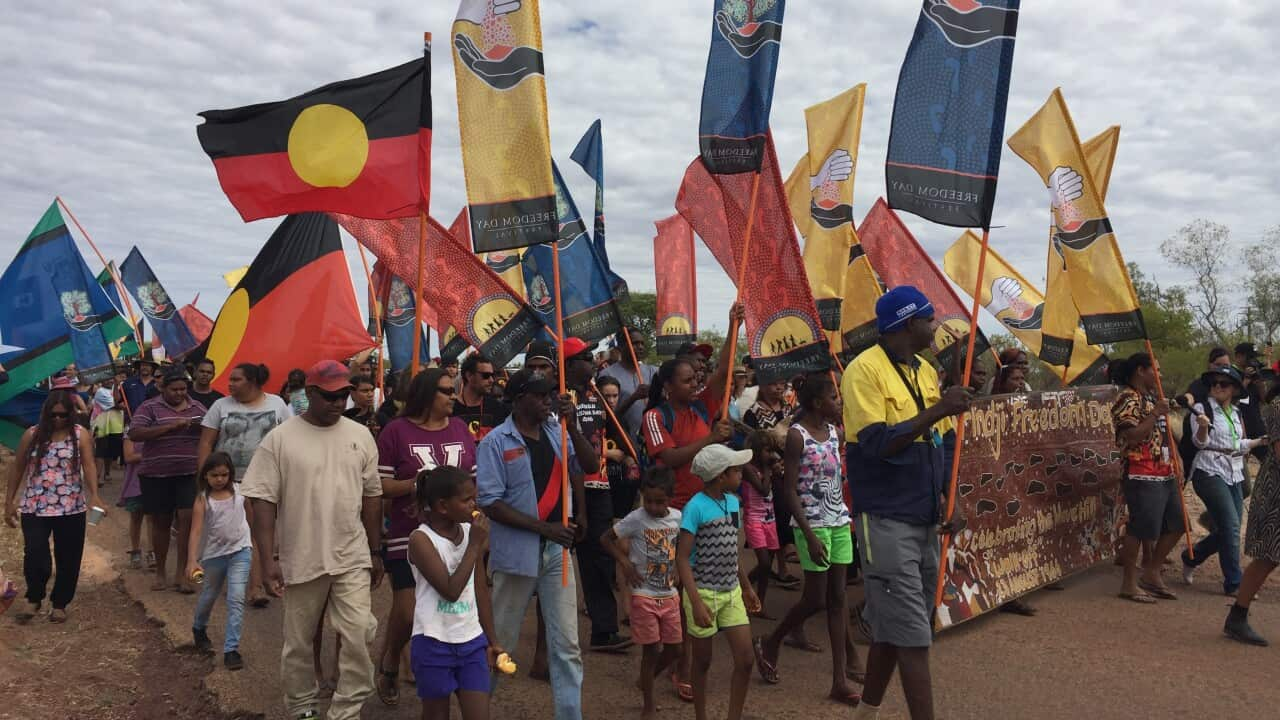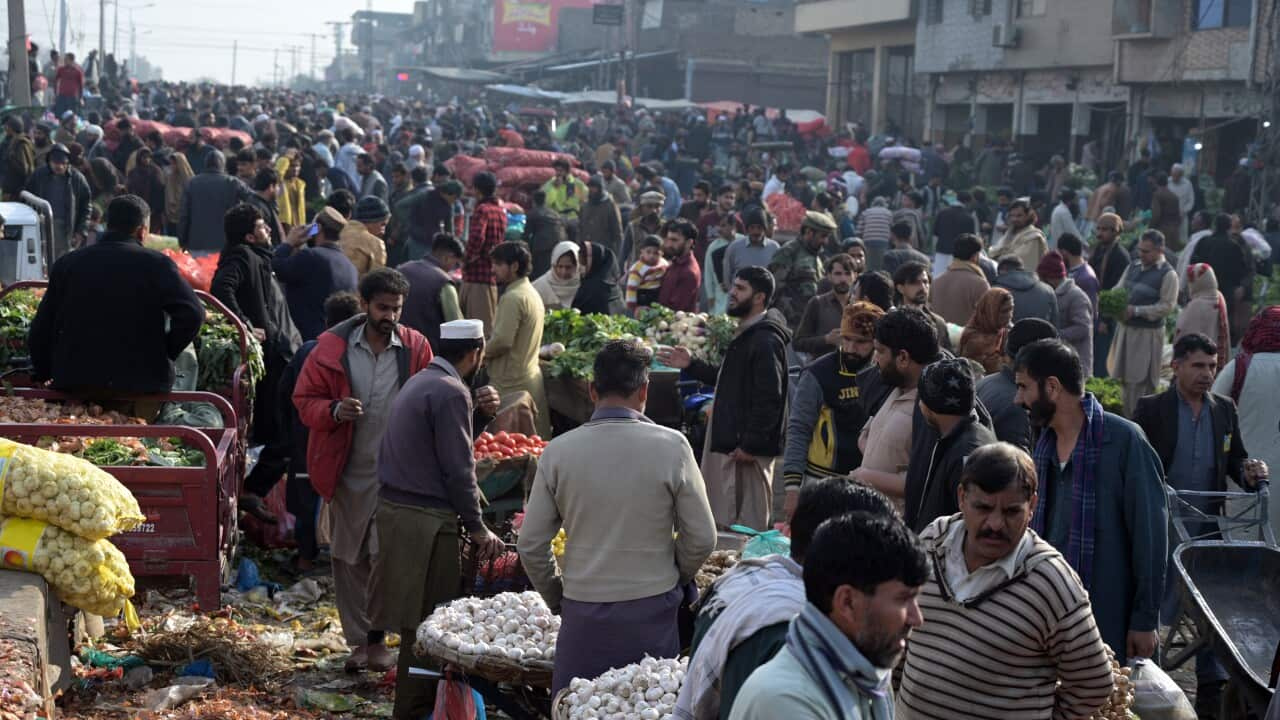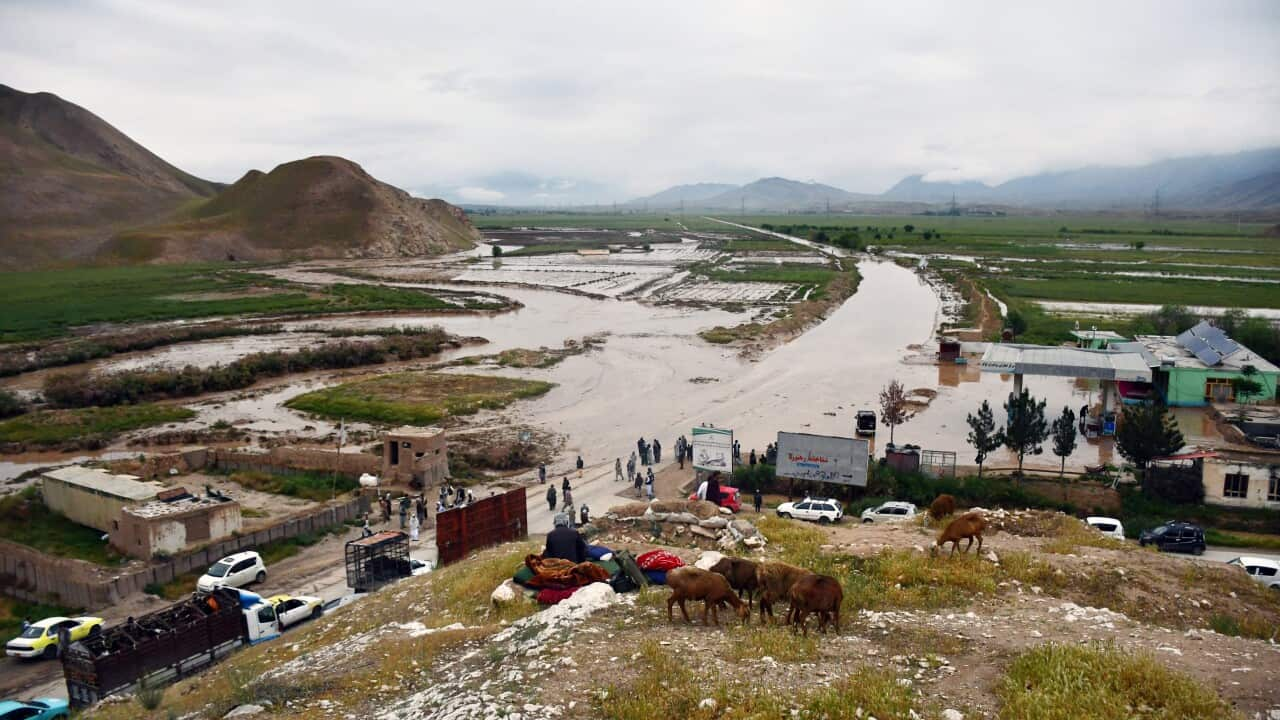Presenter 1
SBS acknowledges the Traditional Custodians of Country and their connections and continuous care for the skies, lands and waterways across Australia.
Presenter 2
You're listening to Australia Explained, an SBS audio podcast helping you navigate life in Australia.
Nakayh Hutchings
Yama, I'm Nakayh Hutchings, a Wanneroo Rongai woman from central west New South Wales, and joining you today from Cammraygal country in Sydney. Welcome to this special episode of Australia Explained, where we explore indigenous land rights. You may hear the protest chants, what do we want, land rights. But what does it really mean? Land is at the heart of Aboriginal and Torres Strait Islander identity, culture, and well-being. Known as country, it includes land, waterways, skies, and all living things. In this episode of Australia Explained, we explore indigenous land rights, what they involve, which land is covered, who can make claims, and the impact on First Nations communities.
For many years, the connection Aboriginal and Torres Strait Islander peoples have to their land wasn't recognised. Land rights laws were created to give them legal control over their traditional lands. Before colonisation, Aboriginal and Torres Strait Islander peoples cared for the land for tens of thousands of years. But colonisation took that land without any agreement based on the false idea of terra nullius, meaning land belonging to no one.
The land rights movement gained attention in 1966 with the Wave Hill walk off. Then in 1967, a national referendum allowed the government to make laws for First Nations people. In 1976, the Aboriginal Land Rights Northern Territory Act was passed, the first law to recognise traditional land claims. While some states have their own land rights, Australia doesn't have a national law yet. This also led to the establishment of land councils to represent Aboriginal and Torres Strait Islander peoples and help manage land that's being returned to them. Land rights only apply to government owned crown land, not private property, and it can't be sold or mortgaged. It's held in trust so First Nations people can care for their country and make decisions about it. In discussing First Nations decision making, Dr. Virginia Marshall, a Wiradjuri Nyemba woman and water rights expert, explains the deep significance of the connections that First Nations people have with the land and water.
Dr. Virginia Marshall
The water speaks to us, or the, or the trees speak to us, but we don't need to take on a Western environmental, um, ideology and dialogue that isn't. Based in our understanding and our law and our understanding of our creation stories.
Nakayh Hutchings
So, let's breakdown something that can be a bit confusing. Land rights, native title, and treaty. They're often talked about together, but they each mean different things. Land rights are laws made by the government that return certain areas of land to Aboriginal and Torres Strait Islander communities. These lands are usually managed through land councils which represent and support the communities. Then there's native title. That's a legal recognition that some First Nations people still have rights to their land and waters based off their traditional laws and customs, customs that have been maintained for thousands of years. And finally, treaty. A treaty is a formal agreement between governments and First Nations peoples. It's something countries like New Zealand and Canada already have, but here in Australia, we're still working toward one. There's no national treaty, at least not yet. Together, these approaches aim to deliver justice, recognition and real change. Restoring land allows communities to reconnect with language, culture, and country. And it also supports things like housing, health, and economic independence. Dr Marshall explains the significance.
Dr. Virginia Marshall
We need to be self-determining whether it's leading a committee, leading research, leading new ideas, forging new opportunities and partnerships in technology, um, you know, and also health.
Nakayh Hutchings
The real life impact of land rights has been profound. The The Darkinjung Local Aboriginal Land Council, founded under the New South Wales Aboriginal Land Rights Act, has become a powerful example of what land rights can achieve. Uncle Barry Duncan, a a Gomeroi man, was one of the original founders of Darkinjung, which was incorporated in his parents' backyard in 1983.
Uncle Barry Duncan
What it means for me is that brought this community together. It was a way of getting land invested back into Aboriginal ownership.
Nakayh Hutchings
over his lifetime, Uncle Barry has seen how land. Rights have enabled economic empowerment and self-determination for his community on the central coast of New South Wales. Uncle Barry explains.
Uncle Barry Duncan
I think that the future now, is that when the original land rights got handed down, there was a lot of talk from non-Aboriginal people about how we are going to take their backyards, and claim really stuff that was said about us that was a lot of detriment, but now people know, I think in this generation, that we were very wise and smart with the land holdings.
Nakayh Hutchings
It's important to understand that giving indigenous people land rights doesn't mean taking away people's homes or backyards. Land rights apply to specific areas of crown land, government owned land, not private property.
Nakayh Hutchings
It's about returning land to First Nations communities where there is a recognised connection, often through historical occupation or cultural significance. Despite progress, challenges remain. The process can be slow and complex, and only limited land is available. Land rights are closely tied to broader efforts for justice, reconciliation and recognition of First Nation sovereignty. For those new to Australia, understanding land rights is a powerful step toward connecting with the country's deeper story. It's not about losing land, it's about recognising and restoring a connection that has existed for over 60,000 years between First Nations people and the land. Thank you for listening to this episode of Australia Explained, written and hosted by me, Nakayh Hutchings, and Australia Explained managing editor, Rosa Germian.
Presenter 2
This was an SBS audio podcast. For more Australia explained stories, visit sbs.com.au/australiaexplained.
Maram Ismail
Subscribe or follow the Australia Explained podcast for more valuable information and tips about settling into your new life in Australia. Do you have any questions or topic ideas, send us an email to australiaexplained@sbs.com.au.





